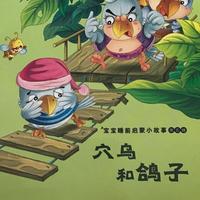小熊 傻眼 了
|ошарашен|
Little Bear|dumbfounded|
|ficou surpreso|
Der Bär ist verblüfft.
Bear is dumbfounded
El oso se queda boquiabierto.
L'ours est abasourdi.
ベアは唖然
곰은 어리둥절합니다.
O urso fica estupefacto.
Медведь ошеломлен.
小熊傻眼了
小 动物 们 都 聚 在 池边 聚精会神 地 钓鱼 。
||||собираться||у пруда|Сосредоточенно||ловить рыбу
|little animals|plural marker||gather||by the pond|focused||fishing
|||||||||pescar
Die kleinen Tiere versammelten sich um den Pool, um intensiv zu fischen.
The little animals gathered at the pool and fished intently.
Os pequenos animais estão todos reunidos à beira do lago, concentrados em pescar.
这次 钓鱼 大赛 规定 : 谁 钓 的 鱼 个儿 最大 , 最重 , 就 奖给 谁 一枚 金牌 !
||соревнование|правила||рыбалка|||размер||самый тяжелый||наградить||одна медаль|
this time|fishing|competition|rules|who|fishing||fish|size|largest|heaviest||awarded to||a medal|gold medal
desta vez||competição|||pescar|||tamanho||||premiar||uma|medalha de ouro
Bei diesem Angelwettbewerb gilt: Wer den größten und schwersten Fisch fängt, bekommt eine Goldmedaille!
This fishing competition stipulates: Whoever fishes is the biggest and heaviest, he will be awarded a gold medal!
Neste torneio de pesca, a regra é: quem pescar o peixe maior e mais pesado, ganhará uma medalha de ouro!
咦 ?
Huh
Huh?
Eh?
小熊 咋 不见 了 ?
|как|не видно|
Little Bear|how|disappeared|
|como||
Warum fehlt der kleine Bär?
Why is the bear missing?
Por que o ursinho não aparece?
原来 这 家伙 有 他 自己 的 主意 呢 , 他 想 : 大家 挤 在 一个 地方 钓鱼 , 鱼 都 被 吓跑 了 , 我 何不 另 找个 地方 呢 !
||парень||||||||||толпиться||||||||испугать рыбу|||почему не||найти другое||
turns out||this guy|||||idea|emphasis particle||thought||crowd|||place|fishing|||passive marker|scared away|||Why not|another|find another place||
|||||||||||||||||||||||por que não||||
Es stellte sich heraus, dass dieser Typ seine eigene Idee hatte und dachte: Alle drängten sich an einem Ort zum Fischen, und der Fisch wurde verscheucht. Warum suche ich mir nicht einen anderen Ort?
It turned out that this guy had his own idea. He thought: Everyone crowded in one place to fish, and the fish was scared away. Why don't I find another place!
Na verdade, este cara tem suas próprias ideias, ele pensou: todo mundo se espremendo em um lugar para pescar, os peixes fogem, por que eu não vou procurar outro lugar?
小熊 来到 池塘 另一侧 开始 钓鱼 , 一会儿 鱼漂 就 上下跳动 了 , 可是 他 使劲 拉 也 拉不动 鱼竿 。
|||другой стороне||||поплавок||вверх-вниз||||сильно|||не может потянуть|удочка
Little Bear||pond|the other side|started|fishing|a moment later|float||bobbing up and down||||with all his strength|pull||can't pull|fishing rod
|||||||flutuador||subindo e descendo|||||||não consegue mover|vara de pescar
Der kleine Bär kam auf die andere Seite des Teiches und fing an zu fischen, nach einer Weile sprang die Pose auf und ab, aber er konnte die Angel nicht zu stark ziehen.
Cub came to the other side of the pond and started fishing. After a while, the float jumped up and down, but he couldn't pull the fishing rod too hard.
O ursinho foi para o outro lado do lago e começou a pescar, depois de um tempo o flutuador começou a balançar para cima e para baixo, mas ele puxou com força e não conseguiu mover a vara de pescar.
小熊 觉得 自己 肯定 钓上 了 一条 大鱼 !
||||поймал|||
|feels||definitely|caught a big fish||a big fish|big fish
||||pegou|||peixe grande
Der kleine Bär glaubt, dass er einen großen Fisch gefangen haben muss!
The bear felt that he must have caught a big fish!
O pequeno urso acha que definitivamente pegou um grande peixe!
于是 他 使 足 了 浑身 的 劲儿 , 拼命 拉着 鱼竿 , 那鱼 终于 被拉出 了 水面 …… 原来 是 一条 大 鳄鱼 !
|||ноги||всё тело||силы|изо всех сил|||та рыба||вытянута из||поверхность воды|||||
So||made|foot||whole body||strength|with all his strength|pulling|fishing rod|the fish|finally|pulled out||water surface|turns out||a big crocodile||crocodile
||||||||||vara de pescar|aquela peixe||sendo puxada|||||||
Also versuchte er sein Bestes, um die Angelrute zu ziehen, und der Fisch wurde schließlich aus dem Wasser gezogen... Es stellte sich heraus, dass es sich um ein großes Krokodil handelte!
So he tried his best to pull the fishing rod, and the fish was finally pulled out of the water... It turned out to be a big crocodile!
Então, ele usou toda a força que tinha e puxou a vara de pescar com todas as suas forças. O peixe finalmente foi puxado para fora da água... Na verdade, era um grande crocodilo!
小熊 拖 着 大 鳄鱼 的 尾巴 来到 大象 裁判 面前 。
|тащить||||||||судья|
Little Bear|dragging|||crocodile||tail||elephant|judge|in front of
|||||||||juiz|
Der kleine Bär zog den Schwanz des Krokodils zum Elefanten-Schiedsrichter.
The bear dragged the tail of the crocodile to the elephant referee.
O pequeno urso arrastou a cauda do grande crocodilo até a frente do juiz elefante.
他 满 有把握 地问 :“ 怎么样 , 这 钓鱼 冠军 该是 我 的 了 吧 ?
|полон|уверен|поинтересовался||||чемпион|должен быть||||
|very|confident|confidently asked|How about it|this|fishing|champion|should be||||
||tem certeza||||||||||
Er fragte selbstbewusst: "Nun, dieser Angelmeister sollte mir gehören, oder?
He asked with certainty, "How about, should this fishing champion be mine?
Ele perguntou com confiança: "Como está, este campeonato de pesca deve ser meu, certo?"
”
大象 笑 着 说 :“ 傻 孩子 , 鳄鱼 根本 不是 鱼 。
||||глупый|||||
elephant|smiled|||silly||crocodile|not at all||fish
||||bobo|||||
"Der Elefant lächelte und sagte: "Dummer Junge, ein Krokodil ist überhaupt kein Fisch."
"Elephant said with a smile:" Stupid child, crocodile is not a fish at all.
"O elefante sorriu e disse: "Criança tola, o crocodilo não é peixe."
鱼用 腮 呼吸 , 鳄鱼 用 肺 呼吸 。
рыба|жабры||||легкие|
fish use|gills|breathing|crocodile|use|lungs|breathing
peixe||respirar|||pulmão|respira
Der Fisch atmet mit seinen Kiemen und das Krokodil atmet mit seinen Lungen.
Fish breathe with gills, and crocodile breathes with lungs.
Os peixes respiram pelas brânquias, os crocodilos respiram pelos pulmões.
鱼 是 卵生 的 , 可 鳄鱼 却是 从 蛋里 钻出来 的 。
||яйцекладущий||||но|||выходит|
||oviparous|||crocodile|but|from|the egg|hatch out|
||||||mas|||saiu|
Der Fisch ist im Ei geboren, aber das Krokodil ist aus dem Ei herausgekommen.
The fish is egg-born, but the crocodile got out of the egg.
Os peixes são ovíparos, mas os crocodilos saem dos ovos.
” 这下 小熊 傻眼 了 !
At this moment|Little Bear|dumbfounded|
||surpreendido|
„Jetzt ist der kleine Bär sprachlos!
"Now Little Bear is dumbfounded!
Agora o ursinho ficou surpreso!

